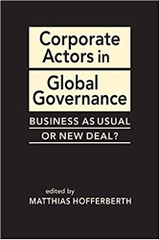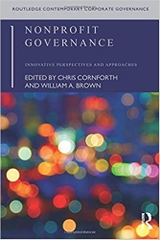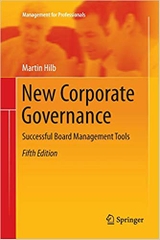-
-
-
Tổng tiền thanh toán:
-
-
Thông tin
-
Tìm sách theo yêu cầu
"This book is a most important contribution for both new and experienced directors, addressing contemporary corporate governance. The 14 practical questions represent the most vital issues that boards need to proactively address and are particularly crucial now as boards deal with the aftermath of the global financial tsunami."
—Thomas J. Neff, chairman, U.S., Spencer Stuart
—Thomas J. Neff, chairman, U.S., Spencer Stuart
"If Corporate America's board members had answered these questions, the crisis of '08 would have been avoided. The book is that powerful. It should be required reading in every boardroom, executive suite, and business school on the planet. This book with its singular wisdom could change the face of corporate governance—with huge dividends to shareholders and society."
—Ralph Whitworth, principal, Relational Investors LLC
"Ram Charan always seems to get it right. Owning Up not only asks the right questions, it gives answers that can make a real difference for improving board performance."
—James M. Kilts, former chairman and CEO, The Gillette Company
"As always, well-reasoned, insightful, and thought-provoking. A work that every director will find of value, particularly given the intense pressure of these unprecedented economic times."
—Professor Charles M. Elson, director of the John L. Weinberg Center for Corporate Governance at the University of Delaware
"Here is the book that every corporate director needs today. With his decades of insider experience, Ram Charan brings more wisdom and insight to this subject than anyone else I know."
—Geoff Colvin, Fortune editor and author, Talent Is Overrated: What Really Separates World-Class Performers from Everybody Else
Product Details
- Hardcover: 224 pages
- Publisher: Jossey-Bass; 1 edition (April 13, 2009)
- Language: English
- ISBN-10: 0470397675
- ISBN-13: 978-0470397671
- Product Dimensions: 9 x 6.4 x 0.9 inches
- Shipping Weight: 14.4 ounces (View shipping rates and policies)
- Average Customer Review: 4.6 out of 5 stars See all reviews (9 customer reviews)
- Amazon Best Sellers Rank: #145,456 in Books (See Top 100 in Books)
Editorial Reviews
From the Inside Flap
Owning Up
Your world as a director has suddenly changed. You've seen members of other boards take the heat when their companies imploded. The managements of Lehman Brothers, Bear Stearns, Merrill Lynch, and Washington Mutual clearly failed, but so did their boards. Now the board of every company beset with problems is coming under scrutiny.
The pressure is on. Your board must own up to its accountability for the performance of the corporation. Governance now means leadership.
Boards must change their modus operandi to address the new and complex issues that are emerging. These include
- Ensuring liquidity in the context of the global financial crisis
-
Setting CEO performance targets in a very uncertain economy
-
Assessing strategy and enterprise risk under extreme volatility
So what should boards do now? What should they be talking about in their meetings and executive sessions? What decisions must they make? How assertive must they be regarding company priorities and operating goals?
In Owning Up, business advisor and corporate governance expert Ram Charan answers these and other burning questions on the minds of directors and business leaders. He describes best practices that are emerging in boardrooms he has observed firsthand. And he provides practical recommendations on a range of issues, from compensation to dealing with external constituencies. Wisely attuned to the human side, he confronts the need for some boards to refresh their composition and for others to rebalance their board dynamics.
Directors, CEOs, general counsels, and operating executives will find here the guidance they need to meet the new and rising standards for corporate governance in this demanding business environment.
About the Author
Ram Charan is the go-to adviser for corporate directors and CEOs. Known for his insights and practical wisdom, Charan has counseled some of the world's most successful business leaders. He is coauthor of the bestseller Execution and author or coauthor of 14 other books including Leaders at All Levels, Boards That Deliver, and Boards at Work. He serves on three boards and was named one of Directorship's top 100 directors. He has an MBA and a doctoral degree with corporate governance as a field of study from the Harvard Business School.
Most Helpful Customer Reviews
14 of 15 people found the following review helpful
By Jeff Lippincott VINE VOICE on April 22, 2009
Format: Hardcover
Comment Was this review helpful to you? YesNoNot a bad book. I kinda liked it. It reminded me of many of the questions that would pop up as I examined corporate board meeting minutes in large securities fraud cases I have worked on as an attorney. The book was not overly short (which has been a problem with this author recently), and I found it to be well written. Included is an introduction and 14 chapters as follows:
0. What Boards need to know
1. Is our Board composition right for the challenge?
2. Are we addressing the risks that could send our company over the cliff?
3. Are we prepared to do our job when crisis erupts?
4. Are we well prepared to name our next CEO?
5. Does our Board really own the company strategy?
6. How can we get the information we need to govern well?
7. How can our Board get CEO compensation right?
8. Why do we need a lead director anyway?
9. Is our governance committee best of breed?
10. How do we get the most value out of our limited time?
11. How can executive sessions help the Board own up?
12. How can our Board self-evaluation improve our functioning & our output?
13. How do we stop from micromanaging?
14. How prepared are we to work with activist shareholders & their proxies?
I was a little surprised about #3 above. I expected the question to read more like: "Are we doing all that is necessary so crisis does not erupt?" And #4 was a little off in my humble opinion, too. Why only be ready to name the next CEO? What about all the other important executive level officers that are critical to the running and operation of the company?
I was surprised there was not a chapter on conflicts of interest and appearances of impropriety.Read more ›
0. What Boards need to know
1. Is our Board composition right for the challenge?
2. Are we addressing the risks that could send our company over the cliff?
3. Are we prepared to do our job when crisis erupts?
4. Are we well prepared to name our next CEO?
5. Does our Board really own the company strategy?
6. How can we get the information we need to govern well?
7. How can our Board get CEO compensation right?
8. Why do we need a lead director anyway?
9. Is our governance committee best of breed?
10. How do we get the most value out of our limited time?
11. How can executive sessions help the Board own up?
12. How can our Board self-evaluation improve our functioning & our output?
13. How do we stop from micromanaging?
14. How prepared are we to work with activist shareholders & their proxies?
I was a little surprised about #3 above. I expected the question to read more like: "Are we doing all that is necessary so crisis does not erupt?" And #4 was a little off in my humble opinion, too. Why only be ready to name the next CEO? What about all the other important executive level officers that are critical to the running and operation of the company?
I was surprised there was not a chapter on conflicts of interest and appearances of impropriety.Read more ›
3 of 3 people found the following review helpful
By John W. Pearson VINE VOICE on January 10, 2010
Format: Hardcover Verified Purchase
Comment Was this review helpful to you? YesNoRam Charan says that "if you have no appetite for risk, you shouldn't be on a board; it will inhibit the CEO from making bold and necessary moves and potentially company-saving bets."
This "go-to adviser" for corporate boards and CEOs, also says that boards must "own up" to its accountability for the performance of the organization and reinvent the content of their work and modus operandi. He preaches, "Governance now means leadership."
Board governance often has fuzzy boundaries and is never easy, but this excellent author/authority has 14 cringe-type questions. If you're a long-time reader of my eNewsletters and/or my Amazon reviews, you may recall my enthusiasm for two of Charan's other books: the best-sellerExecution: The Discipline of Getting Things Done, with Larry Bossidy, and Leaders at All Levels: Deepening Your Talent Pool to Solve the Succession Crisis (J-B US non-Franchise Leadership). His stuff is reliable, insightful and best of all, highly practical.
Charan doesn't waste words, firing this question onto the board table in the first paragraph of Chapter 1/Question 1: Is Our Board Composition Right for the Challenge? He writes, "The role of the board has unmistakably transitioned from passive governance to active leadership with a delicate balance of avoiding micromanaging. It's leadership as a group, not leadership by an appointed person." He adds, "With the right composition, a board can create value; with the wrong or inappropriate composition, it can easily destroy value.Read more ›
This "go-to adviser" for corporate boards and CEOs, also says that boards must "own up" to its accountability for the performance of the organization and reinvent the content of their work and modus operandi. He preaches, "Governance now means leadership."
Board governance often has fuzzy boundaries and is never easy, but this excellent author/authority has 14 cringe-type questions. If you're a long-time reader of my eNewsletters and/or my Amazon reviews, you may recall my enthusiasm for two of Charan's other books: the best-sellerExecution: The Discipline of Getting Things Done, with Larry Bossidy, and Leaders at All Levels: Deepening Your Talent Pool to Solve the Succession Crisis (J-B US non-Franchise Leadership). His stuff is reliable, insightful and best of all, highly practical.
Charan doesn't waste words, firing this question onto the board table in the first paragraph of Chapter 1/Question 1: Is Our Board Composition Right for the Challenge? He writes, "The role of the board has unmistakably transitioned from passive governance to active leadership with a delicate balance of avoiding micromanaging. It's leadership as a group, not leadership by an appointed person." He adds, "With the right composition, a board can create value; with the wrong or inappropriate composition, it can easily destroy value.Read more ›
1 of 1 people found the following review helpful
By Rolf Dobelli HALL OF FAME on February 7, 2010
Format: Hardcover
Corporate directors have their hands full. They must help their companies prosper, keep their shareholders happy, establish sensible CEO performance standards, and evaluate strategy and risk in a volatile business climate. How can board members keep all those balls in the air? These dilemmas have no easy answers, but Ram Charan, best-selling business author and leading expert on corporate governance, provides excellent suggestions for this formidable balancing act. Though his text sometimes digresses - interestingly - from its mission, Charan provides board members with many useful, if not entirely new, insights. If you are a corporate director or even if you sit on a nonprofit's board, getAbstract believes you can gain a lot from reading this superb, savvy book.
XEM THÊM TẠI AMAZON.COM
- Thông tin chi tiết
- Mục lục
- Đọc thử
- Đọc thử
- Đánh giá & bình luận của người mua
- Những cuốn sách cùng chủ đề hoặc có liên quan
Link: http://www.amazon.com/Owning-Up-Questions-Every-Member/dp/0470397675/
Tại web chỉ có một phần nhỏ các đầu sách đang có nên nếu cần tìm sách gì các bạn có thể liên hệ trực tiếp với Thư viện qua Mail, Zalo, Fanpage nhé
Đăng ký nhận tin qua email
Hãy đăng ký ngay hôm nay để nhận được những tin tức cập nhật mới nhất về sản phẩm và các chương trình giảm giá, khuyến mại của chúng tôi.












